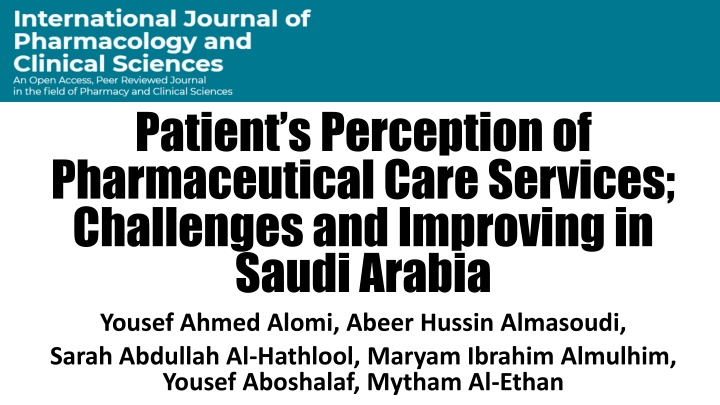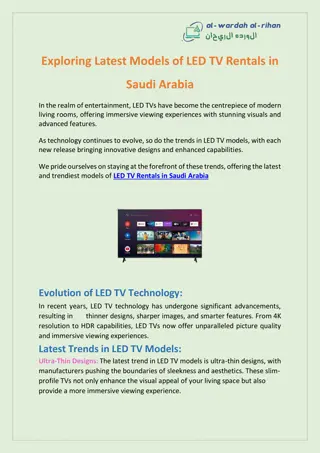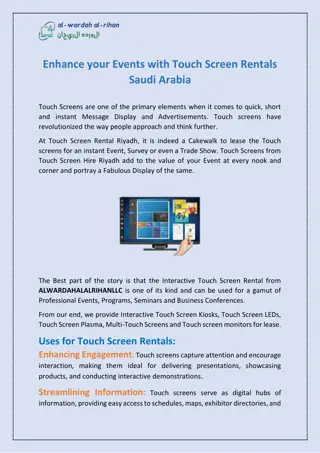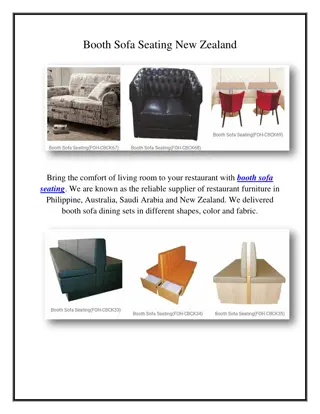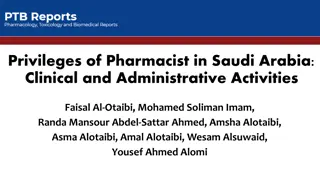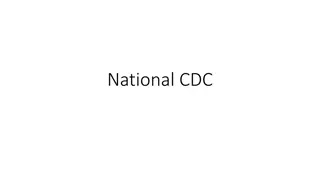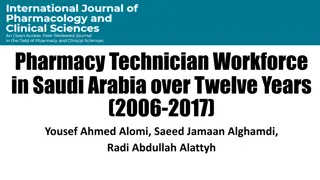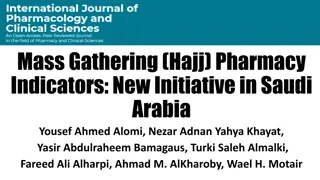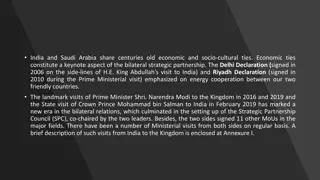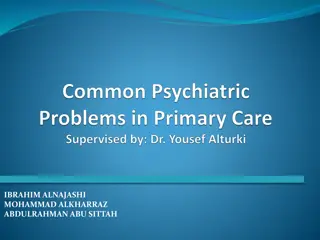Patient Perception of Pharmaceutical Care Services in Saudi Arabia
This study explores patient perception of pharmaceutical care services in Saudi Arabia, highlighting challenges and developments. Results show patients' interactions with pharmacists, satisfaction with services, and suggestions for improvement.
Download Presentation

Please find below an Image/Link to download the presentation.
The content on the website is provided AS IS for your information and personal use only. It may not be sold, licensed, or shared on other websites without obtaining consent from the author.If you encounter any issues during the download, it is possible that the publisher has removed the file from their server.
You are allowed to download the files provided on this website for personal or commercial use, subject to the condition that they are used lawfully. All files are the property of their respective owners.
The content on the website is provided AS IS for your information and personal use only. It may not be sold, licensed, or shared on other websites without obtaining consent from the author.
E N D
Presentation Transcript
Patients Perception of Pharmaceutical Care Services; Challenges and Improving in Saudi Arabia Yousef Ahmed Alomi, Abeer Hussin Almasoudi, Sarah Abdullah Al-Hathlool, Maryam Ibrahim Almulhim, Yousef Aboshalaf, Mytham Al-Ethan
ABSTRACT ABSTRACT: : Purpose Purpose: : To explore the patient s perception of Pharmaceutical care services; challenges and developments in Saudi Arabia. Methods sectional survey of patient perception of pharmacists. The survey consisted of two- part demographic information and second part forty-nine questions divided into four domains. It included domain 1: Patient general perception of pharmacist domain 2: patients perception of pharmaceutical care services, domain 3: patient perception of visiting ambulatory care and domain 4: Patient s perception of the pharmacist s relationship and counseling. The 5-point likert response scale system was used. The questions were open and closed-ended. The survey was distributed through social media and as a 500-bed general hospital in Alhassa region, an ambulatory care pharmacy. The authors did the patients documentation. The survey was made an electronic format and it analyzed domain two about patient perception of pharmaceutical care services; challenges and developments in Saudi Arabia through the survey monkey system. Methods: : It is a 4-months cross- interview with electronic survey
ABSTRACT: ABSTRACT: Results Results: : The total responders were 617 patients. Of those, 536 (87.7%) was Saudi and 75 (12.3%) was non-Saudi. The gender distribution 457 (74.1%) were females and 160 (25.9%) were males. The majority of patients visited the pharmacy in the past 12-months was 222 (36%) more than ten times while 122 (19.8%) attended (5-9 times). Most of the patient visited the pharmacy at evening 395 (64.6%). Most of the patients 481 (83.5%) spent less than 11 min with the pharmacist. The most pharmaceutical care services provided to patients were dispensing of prescribed medication 390 (70.8%), medication consultation 262 (47.5%), dispensing of non-medications, supplements 233 (42.3%) and dispensing of over the counter medications 229 (41.6%). The high scores of the pharmaceutical care services provide to the patients were in private s hospitals (3.71) and community pharmacies (3.63). The most current experience of perception and challenges with high propriety scores were some pharmacy crowding, medication labels missed and patient privacy missed. The most future perception suggestion with high propriety and opportunity scores were published the pharmacy location through social media and implementation of adverse drug reaction reporting for patients. Conclusion is a crucial tool to improve pharmaceutical care. Monitor implementation of the patient medication education system with private places, monitoring of drug-related problems will support the future vision of patient perception and attitude towards the pharmacist. Conclusion: : Patients perception
Key Words : Key Words : Patient, Perception, Pharmaceutical Care, Challenges, Saudi Arabia.
CONCLUSION: CONCLUSION: Patients perception is a crucial tool to improve pharmaceutical care. Monitor implementation of the patient medication education system with private places, monitoring of drugrelated problems will support the future vision of patient perception and attitude towards the pharmacist. However, more studies are required to discover further the real reasons behind the absence of pharmaceutical care services in community pharmacies and the best means of addressing this problem.
